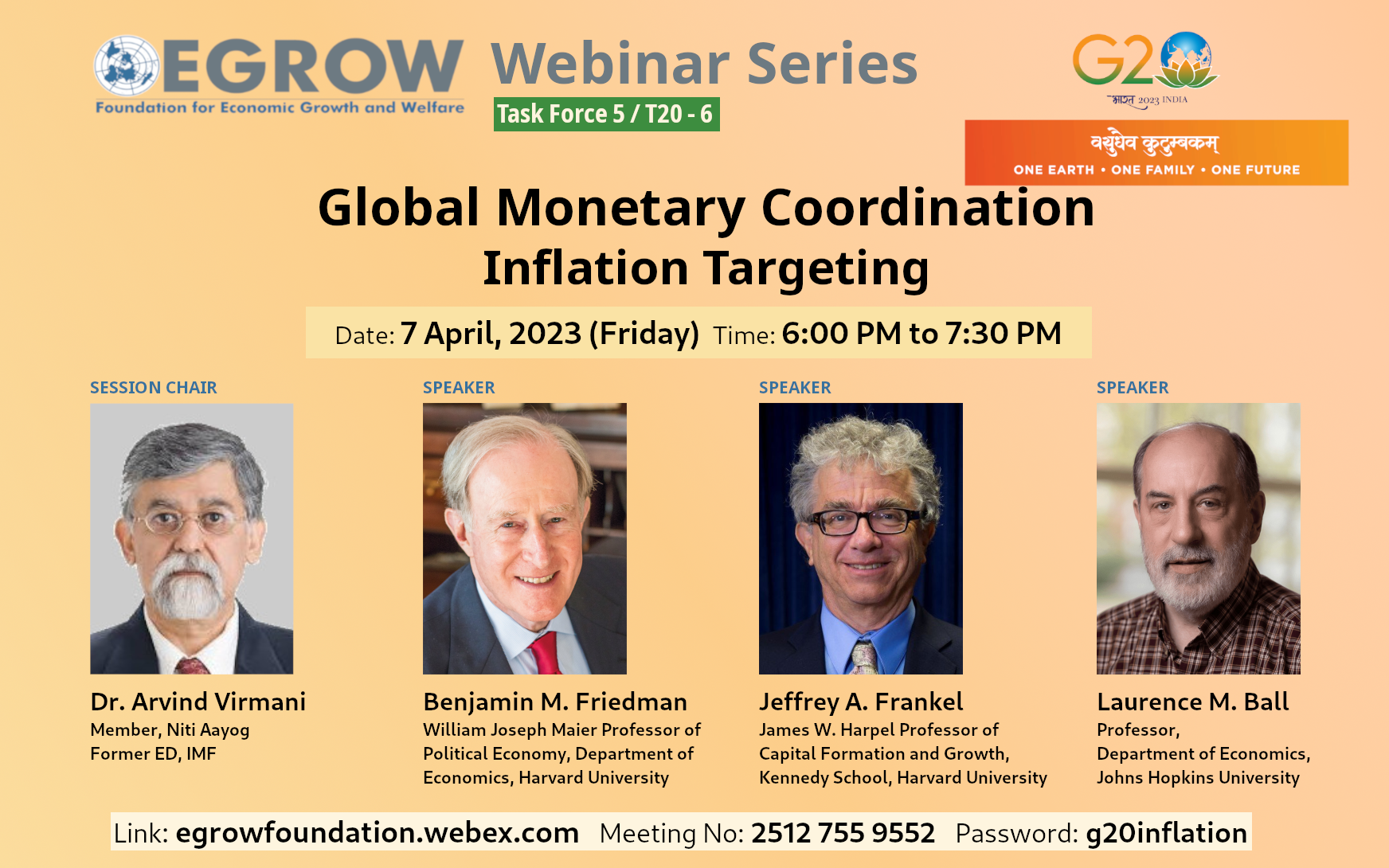Global Monetary Coordination: Inflation Targeting

Webinar Link
Meeting No: 2512 755 9552
Password: g20inflation
Certificate of Participants
To recieve certificates, please register and attend
Abstract
In recent years, a number of industrialized countries have adopted a strategy for monetary policy known as 'inflation targeting'(IT). The two major prerequisites for adopting inflation targeting are a degree of independence of monetary policy and absence of commitment to a particular level for the exchange rate. A country satisfying these requirements could choose to conduct its monetary policy in a framework of inflation targeting. Fifty-five economies have used such a framework and have so far met with apparent success prior to the pandemic. Post pandemic the AEs are increasing interest rates ina large manner to control inflation and the developing countries which have adapted IT framework are forced to follow it because none wants the flight of capital because of interest differential. The AEs can face the brunt of their growth prospects owing to high interest rates but the developing economies cannot afford such luxury. The panel discussion revolves around the relevance of IT in the post pandemic era and tries to bring out a balanced approached towards monetary policy.
About the Speakers
Dr. Arvind Virmani
Arvind Virmani is member of NIti Aayog. He was Chairman of the Foundation for Economic Growth and Welfare (EGROW) and President of the Forum For Strategic Initiatives (FSI, Delhi). He has been a Mentor (economic policy) to FICCI & a member of RBI Technical Advisory Committee on Monetary policy He was earlier Executive Director, IMF and Chief Economic Advisor, Ministry of Finance and Principal Advisor, Planning Commission. During his tenure he advised on a host of economic policy reforms, through 100s of policy papers, notes and committees. He has served as Member, Telecom Regulatory Authority of India (TRAI) and as Director & Chief executive of the Indian Council for Research on International Economic Relations (ICRIER). He has published 35 journal articles and 20 book chapters and written over 50 other working papers in the areas of Macroeconomics, growth and finance, tax reform, International trade & Tariffs, International relations, and national security strategy.
Benjamin M. Friedman
Benjamin M. Friedman is the William Joseph Maier Professor of Political Economy, and formerly Chairman of the Department of Economics, at Harvard University.
Mr. Friedman’s newest book, to be published by Knopf in January 2021, is Religion and the Rise of Capitalism – a fundamental reassessment of the foundations of current-day economics, showing how religious thinking has shaped economic thinking ever since the beginnings of modern Western economics and how this influence continues to be relevant today especially in the United States. His two other general interest books have been The Moral Consequences of Economic Growth (Knopf) and Day of Reckoning: The Consequences of American Economic Policy Under Reagan and After (Random House).
Mr. Friedman received the A.B., A.M. and Ph.D. degrees in economics from Harvard University; during his graduate study at Harvard he was a Junior Fellow of the Society of Fellows. In addition, he received the M.Sc. degree in economics and politics from King's College, Cambridge (U.K.), where he studied as a Marshall Scholar. Among other distinctions, he has received the George S. Eccles Prize, awarded annually for excellence in writing about economics; the John R. Commons Award, given every two years in recognition of contributions to economics; and the Medal of the Italian Senate.
Jeffrey A. Frankel
Jeffrey A. Frankel is James W. Harpel Professor of Capital Formation and Growth. He is a Research Associate at the National Bureau of Economic Research. He served at the Council of Economic Advisers in 1983-84 and 1996-99; as CEA Member in the Clinton Administration, Frankel's responsibilities included international economics, macroeconomics, and the environment. Before coming to Harvard in 1999, he was Professor of Economics at the University of California at Berkeley.
His research interests include currencies, commodities, crises, international finance, monetary policy, fiscal policy, regional trade blocs, and international environmental issues. Born in San Francisco, he graduated from Swarthmore College, and received his economics PhD from MIT.
Laurence M. Ball
Laurence Ball is Professor of Economics at Johns Hopkins University. He is also a Research Associate at the National Bureau of Economic Research and a consultant for the International Monetary Fund. He has previously been a Visiting Scholar at a number of central banks, including the Federal Reserve, the European Central Bank, the Bank of Japan, the Bank of England, and the Reserve Bank of New Zealand.
His research topics include unemployment, inflation, fiscal and monetary policy, and financial regulation, and he is the author of The Fed and Lehman Brothers: Setting the Record Straight on a Financial Disaster (Cambridge University Press, 2018).